Our scientific Advisory Board is composed of external experts that provide a bird’s eye overview of the project at large. These leaders in their field will also provide key contacts to engage scientific, commercial and social stakeholders. The MIX-UP Advisory Board consists of three external members of considerable reputation in the scientific and dissemination activities related to the project.
Our Advisory Board Members
Deutsche Bundesstiftung Umwelt
The Deutsche Bundesstiftung Umwelt (DBU) is one of Europe's largest foundations. It promotes innovative exemplary projects in the field of environmental protection.
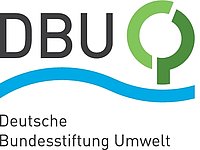
Contact
- Dr Hans-Christian Schaefer
Netherlands Organisation for Applied Scientific Research
The Netherlands Organisation for Applied Scientific Research (TNO) is the largest fully independent research, development and consultancy organisation in the Netherlands with a staff of about 3,000 and a total annual turnover of more than 500 million Euros. It derives a significant portion of its contract R&D from foreign private sector, governments and international organisations. TNO’s primary tasks are to support and assist trade and industry including SME’s, governments and others in technological innovation and in solving problems by rendering services and transferring knowledge and expertise.

Contact
- Dr Esther Zondervan-van den Beuken
Wageningen University
Wageningen University (WU) is part of Wageningen University & Research (Wageningen UR). Wageningen UR, a collaboration between Wageningen University and 9 specialised research institutes, is a leading international education and research organization that contributes importantly to the quality of life in the fields of food and food production, sustainable agrosystems, living environment and health, lifestyle and livelihood.

Contact
- Prof. Hauke Smidt
Our Friends
Our friends belong to the international scientific community of researchers in the field of plastic recycling and synthetic biology. They provide relevant input to our project with their own research findings by organising Joint Meetings and Guest Lectures.
If you want to become a member of our network as well, contact us.
BioICEP
Europe’s waste management policy has evolved over the last 30 years – shifting away from discarding waste as an unwanted burden to seeing it as a valued resource. Today, plastic waste is considered a priority waste stream. The EU-funded BioICEP project aims to reduce the burden of plastic waste. Forming a European-Chinese collaboration, the project will develop a solution for mixed plastic pollution environments. Specifically, researchers will work on three innovative booster technologies aimed at increasing plastics degradation to record levels. BioICEP will take a triple-action depolymerisation systems approach to break down plastic waste: mechano-biochemical disintegration processes, biocatalytic digestion and microbial consortia. The outputs will be used as building blocks for new polymers or other bioproducts.

Contact
Athlone Institute of Technology
Materials Research Institute
Dublin Road, Athlone, Co. Westmeath
Ireland
- Dr Margaret Brennan Fournet
SinFonia
SinFonia (Synthetic Biology-guided engineering of Pseudomonas putida for biofluorination) aims at producing novel fluorochemicals in a biological way. Materials containing the chemical element fluorine (F) are extremely important in our modern world, with applications in electronics, healthcare, automotive parts and wearables. Currently, these fluorochemicals are exclusively synthesized using chemical methods, something SinFonia wants to change by bringing a novel chemistry for fluorine in biological systems.

Contact
The Novo Nordisk Foundation
Center for Biosustainability
Technical University of Denmark
Kemitorvet, Building 220, Room 204F
2800 Kgs Lyngby
Denmark
- Dr Pablo Iván Nikel
SynBio4Flav
By using synthetic biology, SynBio4Flav aims to provide a cost-effective alternative to current flavonoid production. SynBio4Flav’s scientific challenge is to produce flavonoids by breaking down their complex biosynthetic pathways into standardized specific parts, which can be transferred to engineered microorganisms within Synthetic Microbial Consortia to promote flavonoid assembly through distributed catalysis. SynBio4Flav’s groundbreaking approach has great potential beyond the production of flavonoids. The project’s ultimate goal is to deliver a paradigm shift in biotechnological manufacturing of complex natural chemicals.
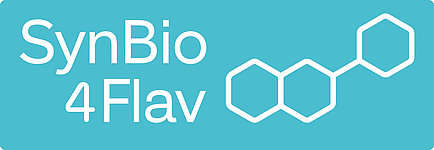
Contact
National Centre for Biotechnology
Spanish National Research Council
Calle Darwin 3
28049 Madrid
Spain
https://synbio4flav.eu
- Dr Juan Nogales
Glaukos
Glaukos* will develop biobased textile fibres and textile coatings that are adapted to the needs of the 21st century.
The complete life cycle of clothing and fishing gear will be redesigned, their sustainability performance will be enhanced significantly, while their technical performance will be matched to end-user requirements.
The ambition is to significantly reduce the carbon and plastic footprint of clothing and fishing gear.
(*Glaukos is the Greek sea god of fishermen. He was commonly believed to protect the oceans, as is the ambition of this project by developing innovative alternatives for textiles that are currently polluting our oceans.)

Contact
- Dr Zsófia Kádár
MIPLACE
MIPLACE (Microbial Integration of Plastics in the Circular Economy) is a multidisciplinary project that aims to transformdifficult-to-degrade plastics into molecules of industrial interest. For this purpose, MIPLACE will engineer microbial communities to make them degrade plastic waste (PET and PU) and use it as feedstock to transform it into high value-added molecules. These resulting substances will be used to produce an easily degradable material of commercial interest: bio-PU.
MIPLACE has a strong focus on sustainability, as it will deliver a novel biotechnological approach to manage the recycling of a material that would have ended up as waste otherwise.
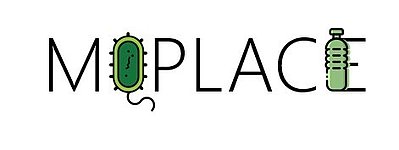
Contact
- Dr José Jiménez
ENZYCLE
Plastic waste is a major and increasing problem for the EU. In 2017, more than 27 million tonnes of plastic waste were produced in the EU28 (plus Norway and Switzerland) – the equivalent of more than 50 kg per citizen. However, less than one-third of this is recycled; the rest is either incinerated or sent to landfill.
Clearly, with the EU’s ambitions for a circular economy, and its stated strategy of achieving 100 % of packaging – including plastics – as recyclable or reusable by 2030, this is unsustainable. It is therefore essential to find ways to recycle the fraction that is currently not recycled, particularly those plastics used for packaging – such as those based on PET (polyethylene terephthalate) and multilayer packaging based on combinations of polyester and poliolefin layers – that make up some 63 % of the total plastic waste generated in Europe.Current mechanical recycling approaches are not ideal; many PET-based materials are plastic mixes or multi-layered, and often specificity is required due to the complex mixtures generated from waste management plants. The application of enzymes, due to their high substrate specificity, can allow this problem to be solved.
The ENZYCLE project will therefore adopt a process based on enzymes. The project will develop new enzymes and advanced processes for treating the non-recycled plastic fraction. This approach will valorise a wide variety of plastic waste, such us PET trays and clamshell, multilayer packaging (mainly PET/PE and PET/PP) and microplastics present in wastewater, producing new materials from the waste, including virgin PET, polyurethane foam and polyols.

Contact
- Licinio Diaz Expósito
- Marta de la Cruz
iMULCH
As plastics production continues to increase globally, topics such as “microplastics” and “plastics in the environment” are the focus of discussions and are becoming more relevant. While the occurrence, distribution and effects of plastics in limnic and marine waters have already been investigated, the data situation regarding plastic emissions in soils is still relatively limited. Up to now, neither the exact routes, quantities and concentrations of polymers in soils nor the effects of plastics on organisms and the soil ecosystem are known.
In the iMulch project, methods are being developed and validated that enable the detection of plastics (micro- and macroplastics) in soils and drainage waters. The analysis primarily focuses on the effect of drainage water on municipal wastewater treatment processes. As an example, plastic emissions from so-called mulch films from agriculture will be analysed. That way, the iMulch project contributes to the assessment of the consequences of plastic inputs not only in water but also for the soil ecosystem. The investigation of terrestrial systems supplements the research on aquatic systems and thus provides the possibility of a holistic view on plastic emissions.
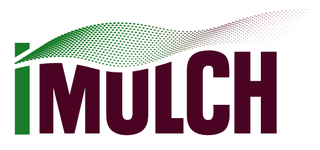
Contact
Institut für Energie- und Umwelttechnik
Bliersheimer Str. 58-60
47229 Duisburg
Germany
- Dr Carmen Wolf
UPLIFT
UPLIFT - sUstainable PLastIcs for the Food and drink packaging indusTry
Recycling facilities are currently struggling when dealing with challenging plastic multi-layers, blends, and additives. Consequently, packaging plastics are mostly landfilled, incinerated or spilled into the environment. The concept of UPLIFT is to introduce biological depolymerization technology as an addition and integration to established recycling practices, by converting persistent plastic waste into more easily recyclable and/or degradable polymers. The project will start by analyzing the value-chains of the future to match and exploit the potential of microbe-and enzyme technology to effectively depolymerize the EoL plastic into monomers. Overall, the project aims at engineering towards greater scale and efficiency. Moreover, in order to contribute to further innovation, UPLIFT will also make use of an advanced high-throughput screening platform to further explore the potential of new and more efficient biocatalysts, among bacteria, yeasts and fungi. Synergies between genetic and protein engineering, as well as eco-engineering of microbial mixed consortia will be under Uplift’s scope. Furthermore, the knowledge of bio-depolymerization will be strategically applied for the eco-design and development of renewable and easy-recyclable polymers, thus making plastic packaging an available feedstock for the circular economy. Introducing biological depolymerization to current recycling practices will increase the capability of dealing with large amounts of currently non-recycled plastics. By doing so, UPLIFT will contribute and facilitate the transition to more efficient recycling facilities, thus paving the way to a sustainable plastic system.

Contact
Aalborg University
Fredrik Bajers Vej 7K,
9220 Aalborg East
Denmark
www.en.aau.dk
https://upliftproject.eu/
- Dr Cristiano Varrone
- Prof. Georg Gübitz
TERMINUS
TERMINUS (in-built Triggered Enzymes to Recycle Multi-layers: an INnovation for USes in plastic-packaging) aims at unlocking the recycling of multi-layer packaging via a range of smart enzyme-containing polymers with triggered intrinsic self-biodegradation properties.

Contact
SIGMA Clermont
20 avenue Blaise Pascal
TS 62006
63178 AUBIERE CEDEX
- Dr Vincent Verney
iCAREPLAST
Integrated Catalytic Recycling of Plastic Residues Into Added-Value Chemicals (iCAREPLAST)
Approximately 70% of European plastic waste (18.5 mt/year) is not being recycled due to technical or economic reasons and are thus sent to landfill (27%) or incinerated (42%). This situation affects negatively the environment in terms of pollution and greenhouse gases emissions, as well as social perception regarding waste management, consumer’s products industry and policy makers.
iCAREPLAST addresses the cost and energy-efficient recycling of a large fraction of today’s non-recyclable plastics and composites from urban waste. Heterogeneous plastic mixtures will be converted into valuable chemicals (alkylaromatic) via chemical routes comprising sequential catalytic and separation steps. This multistage process will also yield carbon char and a pure CO2 stream as products, whilst it will present improved economic sustainability, operational flexibility and lower CO2 footprint thanks to the energetic valorisation of gas by-products through innovative oxycombustion units integrated with efficient heat recovery, the use of AI predictive control and real time optimisation.
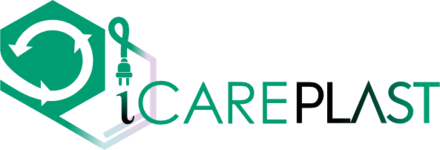
Contact
Instituto de Tecnología Química
(UPV-CSIC)
Campus UPV - Building 6C
Av. los Naranjos s/n
E-46022 Valencia
Spain
- Prof. José Manuel Serra Alfaro
- Dr Laura Almar Liante
upPE-T
At present, more than 98% of plastics are produced from non-renewable sources. Some plastics are biobased, however not all are recyclable, reusable, or biodegradable. Polyethylene (PE) and Polyethylene terephthalate (PET) are the leading plastics used in food packaging. The progressive substitution of consumer products derived from fossil fuels is crucial to decarbonise our society, especially in short shelf life packaging. In 2019, 19% of food & drink packaging plastic post-consumer waste was still sent to landfill and 39.5% was incinerated for energy recovery in Europe. A sustainable management of such plastic waste has become a very challenging problem for the recycling industry globally. Zero landfilling or incineration is needed to achieve the circular economy of plastics. The current alternatives of recycling however have important limitations – (i) mechanical recycling downgrades plastic properties, and (ii) chemical recycling for plastic depolymerisation requires high energy & long reaction times to be effective, consequently only 2% of plastic wastes are chemically recycled.
upPE-T will solve these challenges through an innovative solution for the upcycling PE and PET post-consumer packaging wastes by transforming them into a range of biodegradable & recyclable bioplastics (PHBVs) for food & drink packaging manufacturing.
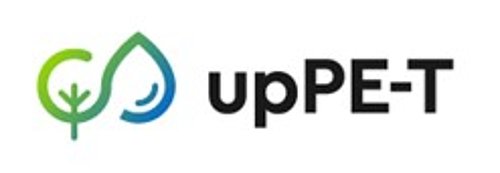
Contact
CETEC Centro Tec. del Calzado y del Plástico
Av. Europa, 4 -5
Polígono Ind. las Salinas
30840 Alhama de Murcia
España
- Fuensanta Monzo
Transfoam
Transfoam’s mission is to develop cutting-edge, bio-based technologies to accelerate decarbonization and eliminate the creation of microplastic pollution.
Using synthetic biology, we are building a modular platform technology capable of consuming industrial waste to produce high-value, sustainable chemicals. Given the urgent need for better plastic production, use and disposal practices, we’ve focused our platform on the co-production of polyhydroxybutyrate (PHB) and an all-natural indigoid dye. PHB is a subclass of polyhydroxyalkanoates (PHAs), bio-based and biodegradable polyesters, that offer comparable strength, barrier properties and shelf life to petroplastics. We will sell PHB masterbatches to bioplastic molders who use it to create fully biodegradable single and multi-use products.
To complement our primary manufacturing activities, we plan to maintain a strong research arm to contribute fundamental improvements to the PHB industry and create licensable solutions to support our primary revenue stream of PHB sales.

Contact
Charlottesville, Virginia
USA
- Alec Brewer
PRESERVE
Bio-based plastics, made in whole or partially from renewable biological resources, are mostly used in packaging applications. Growing concerns around single-use packaging waste is putting pressure on companies to improve the sustainability of their packaging. In this context, the EU-funded PRESERVE project will boost the circular use of bio-based packaging. Specifically, it will work to enhance the performance of primary food packaging. It will leverage the compounding of enzymes in bioplastics to stimulate biodegradation. The entire process that is required to produce at least 10 packaging demonstrators will be upscaled. Project results will benefit Europe’s plastic packaging market by creating jobs and growth.

Contact
- Dr Mara Mennella

